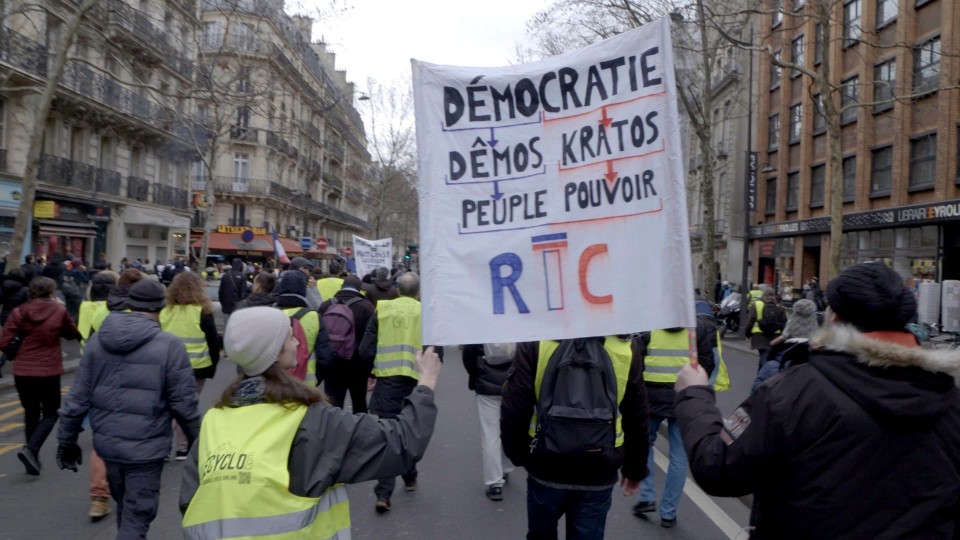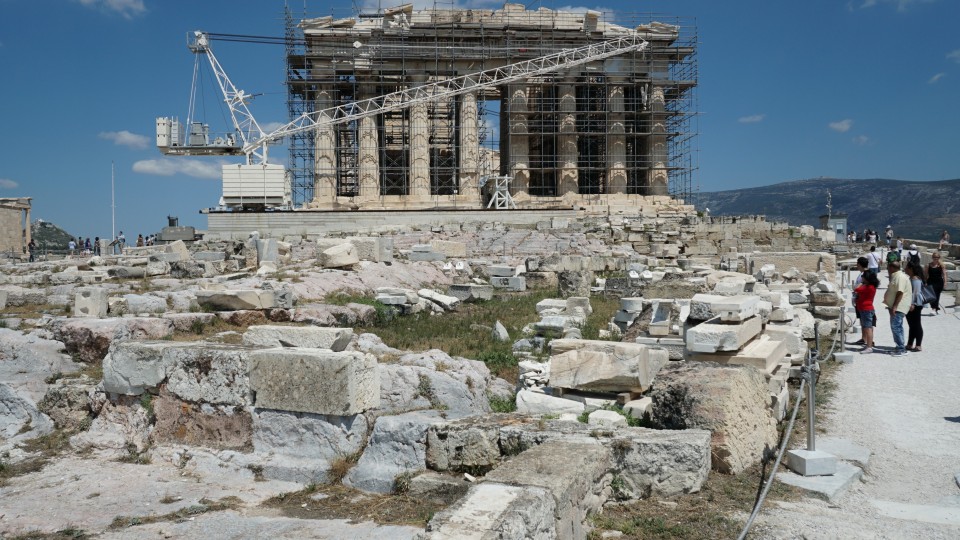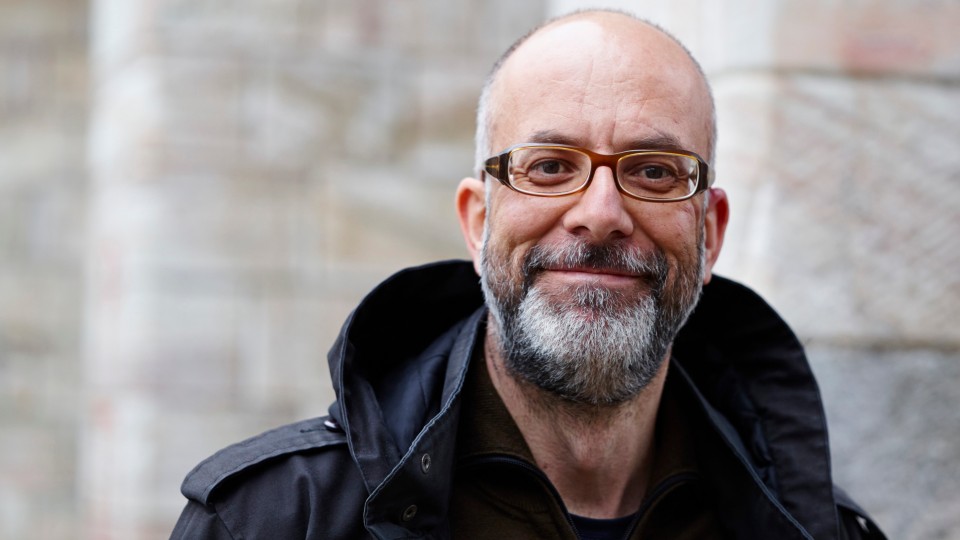Is his documentary film DEMOCRACY LTD Robert Schabus investigates the crisis in European democracy, focussing especially on the failure of the political elite to
listen to the needs of the people. The filmmaker explored the situation in the run-up to the 2017 elections in France and
Germany, analysed the aftermath of the referendums in Great Britain and Greece and looked closely at Austria, now with a right
wing government, in an attempt to understand why populism has met with such powerful resonance in these democracies.
One conversation in DEMOCRACY LTD features political scientist Ivan Krastev, who proposes two dates – 9/11 in America and the year 2015 (with the so-called wave
of refugees) in Europe – as the moments when people's attitudes towards their future changed fundamentally. What were the
first signals for you that the political situation in Europe, though apparently so stable, could change permanently?
ROBERT SCHABUS: In my last project, Exit? I focused on agriculture. One result of this work was that I became aware of considerable sections of our society which are
not reflected in political representation and which are at the mercy of other interests, such as those of the marketplace.
While I was exploring the agricultural sector I found myself identifying a great deal with country life, and in DEMOCRACY LTD I wanted to try and make a film which raised that to a different political level. At the time it was a year before the important
2017 elections in Europe, and the rise of populism was evident everywhere. That prompted me to take a closer look at why mistrust
of politics was on the increase.
You have taken the primary instrument of democracy – direct elections – as the opportunity to film in several countries. You
observe the elections in France and Germany in real time, while in Great Britain and Greece you study the aftermath of the
referendums. Which nuances did you perceive in the attitudes of people in these different countries?
ROBERT SCHABUS: It’s important for me in my work to talk to people at the same level. For example, I spoke to a large number of people in
northern France: if you vote for Marine Le Pen there, it generally doesn't have anything to do with right-wing opinions –
instead, it's a form of protest. If you wanted to find right-wing attitudes, it wouldn't be difficult to do so. But the majority
of voters really don’t share those ideas, and it wasn't my aim to show people echoing Pegida's views or to find the right
wing on the rise. I was interested in people who work in precarious conditions in the countryside, who have been losing out
for two or three decades, and I wanted to find out how they are doing. These people essentially feel they are not taken seriously,
and that's the source of their discontent about immigration. It's not just a question of refugees: it's about migrant workers
and the low level of wages that results. I understand that those people are indignant. I wouldn't rush to ascribe it to a
dubious political ideology – it's much more a case of discontent expressing itself. Of course this groundswell also brings
dubious populist attitudes. But exploring those would be a different film.
How did you perceive the situation in Greece?
ROBERT SCHABUS: My point of departure was the question: "What is democracy? What does it mean to be a shareholder in society?" That's all
finished in Greece. People don't vote anymore; they no longer feel part of Europe, which has deeply disappointed them, just
as their own political class has done. Political decisions have been taken in Greece which contravene the country‘s own democratic
constitution. Fundamental principles have been transgressed to an extent that is hard to imagine from a central European perspective.
We tend not to think about Greece anymore, because the crisis there is supposed to have been overcome. But Greeks no longer
feel they are sovereign citizens. You can sense great melancholy and sadness there, along with a huge lack of interest. For
the vast majority of people, trust in society has disappeared. Pensions were cut a number of times, half the hospitals were
closed down, people suddenly discovered they were no longer insured. Mental disorders, suicide rates and infant mortality
have all risen significantly. We're talking about a member of the EU here, even though it seems impossible from a central
European perspective.
The second main level in DEMOCRACY LTD comprises conversations with experts: politicians, political scientists, journalists and historians. What range of positions
was important to you there? Which of them did you find particularly fascinating?
ROBERT SCHABUS: From a political perspective, the Belgian Paul Magnette, who was Minister-President of Wallonia before we started filming
and was very active in the CETA protests. The whole of Europe felt it had been taken hostage, because Wallonia opposed CETA.
In my view, that was legitimate democratic resistance to a free-trade treaty which undermined political participation. And
it also helped everybody, because as a result standards were raised, even though it still wasn't a good treaty. Today Paul
Magnette is the Social Democratic Mayor of Charleroi, a fascinating person who is very critical of his own movement. For me,
he represents the social democracy of the future. Ulrike Hermann has been respected for many years for his expertise in the
development of capitalism and neoliberalism. In these conversations it was important for me to find ways of seeing that open
up a different conceptual window, because we are all in danger of simply having our views confirmed by everything around us
and therefore increasingly losing any overall perspective. Ivan Krastev is another extraordinary interview partner, because
he's prepared to look at the subject of immigration in a different way. For example, he explains the rise of populism in Eastern
European countries with reference to the depopulation of entire regions of those lands. As a result people coming in from
outside Europe are perceived in a very different way.
You devote the last section of the film to Austria, and you film in a symbol of the rise of Austrian social democracy, the
Karl Marx Hof communal housing project; you also go to a compulsory state school, which just a few decades ago was still a
symbol for us of a society which saw equality of opportunity as one of its core tenets. How illuminating were the statements
of people you talked to in these places, in light of the current political situation?
ROBERT SCHABUS: The individual sections of DEMOCRACY LTD address different subjects, such as the free market or precarious working conditions. In Austria I wanted to give the subject
of immigration more space, because when we were filming that seemed more or less crucial to elections throughout Europe. The
Karl Marx Hof is very significant historically, and between the wars it was a symbol of the powerful socialist movement in
Vienna. It was a time when the social democratic ideal could be successful, because there was a great deal of identification
with it, and a huge amount was happening in society. These days the development of society can also be seen clearly at a place
like the Karl Marx Hof. The old lady I talk to in the film was born in 1929 and has spent virtually her whole life there,
experiencing all the changes. She was politically active with the Communist Party and later with the Austrian Socialist Party,
she worked all her life, and she's seen a transformation in the communal housing project. The thing that strikes her particularly
is that today people's identification with the project, the feeling of having something in common with the other residents
there, has declined. There isn't a feeling of solidarity anymore, and she feels alone there. 20 years ago there was still
a Party treasurer there, so there was direct contact with the Socialist Party. Now that connection between the party and its
base has disappeared.
What prompted you to visit a school for this film?
ROBERT SCHABUS: The school interested me because compulsory education means it's a place where everybody comes together. I picked a school
in Vienna because the situation is more difficult today in urban areas, with a higher proportion of children from an immigrant
background who don't have good German language skills. That means greater educational support is required: more staff, more
money. School is a place where a lot of problems accumulate. The school principal told me she is herself from a working class
family and managed to climb up the social ladder – but she doesn't think that’s possible today in urban areas. In cities at
present it's rare for people to advance socially by means of education.
Ivan Krastev suggests that the perfect symbol of democracy is a person who is prepared to change his opinion as a result of
arguments. Is that a concept of democracy you share?
ROBERT SCHABUS: I regard it as the crucial point. We have to talk to each other a great deal more. People who are at the bottom of society
are not taken seriously. The point of a democracy is not only that you can vote every five or six years. Democracy means creating
an open area for debate where everybody can contribute, everybody is taken seriously and all opinions are represented. That's
where things have to be negotiated. Unfortunately, these days that only happens to a restricted extent, in comparison with
the past. However, there are encouraging signs. In Ireland, where I filmed – although in the end I didn't use the material
– there are what's known as Citizen Assemblies, which were founded after the financial crisis when nobody trusted the political
class anymore and even politicians realised they had to come up with something. 100 citizens, chosen at random from right
across the social spectrum, come together to discuss socially relevant subjects, and in order to do so they obtain comprehensive
information from experts. It was this system which made it possible to legalise abortion in Ireland, for example. And this
Irish model involves a very meaningful analysis of the subject. It is actually what democracy should fundamentally be about:
taking an objective look at something and then discussing it together.
So your title, DEMOCRACY LTD is a powerful evocation of the limitations in an established form of government. Do you have the feeling that democracy based
on a party system is in the process of disintegrating? Do you perceive a sense of unease that could topple a political stability
which has been taken for granted for decades?
ROBERT SCHABUS: I certainly do sense that unease. That's what prompted me to make this film. I can see that political views are becoming
narrower. Democracy per se is becoming a restricted sphere. People are prompted to ask the question: "Am I allowed to say
something or aren't I?" I think that's extremely problematic. There are societies which describe themselves as "democratic"
but have never actually been so. That one point. But it's also the case that a functioning democracy doesn't necessarily remain
that way. We know from history that the situation can change. And that's why it's crucial to consider adopting a different
or an expanded form of political representation, possibly a different way of involving the citizens of a country.
Interview: Karin Schiefer
March 2019
Translation: Charles Osborne





